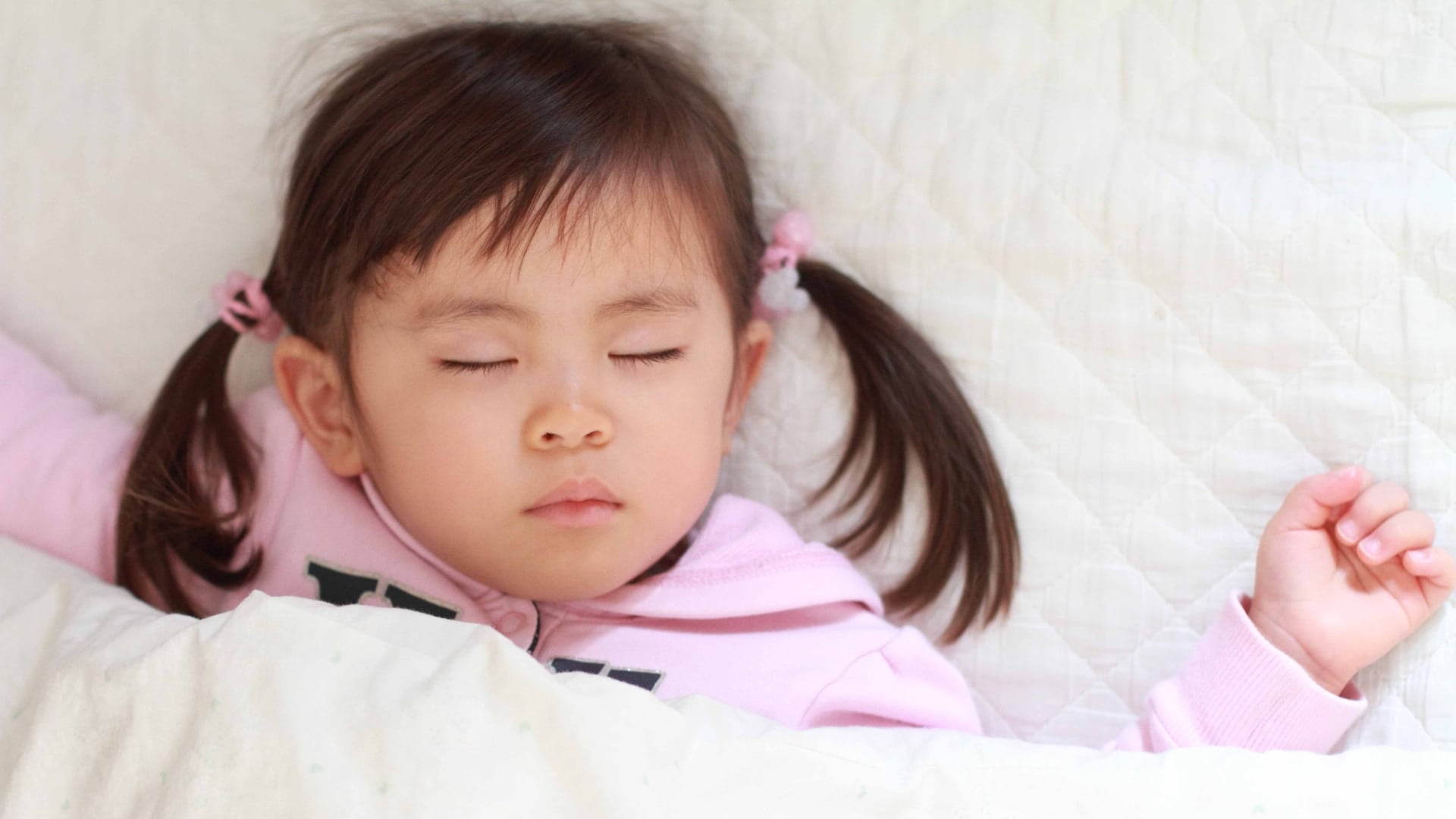Is your 11-month-old still waking up multiple times during the night, only able to sleep when being held, resisting naps, and leaving you feeling exhausted and desperate for a full night’s sleep?
Are you considering sleep training to get your 11-month-old back on track with their sleep?
Well, the good news is that in addition to establishing healthy sleep routines, sleep training an 11-month-old is one of the most effective ways to help your baby (and you) achieve the necessary rest.
In this guide, I will draw on over 40 years of childcare experience to assist your baby in learning to self-soothe and sleep for longer periods.
Continue reading to discover the best approach to sleep training 11-month-old babies that will suit your family perfectly.
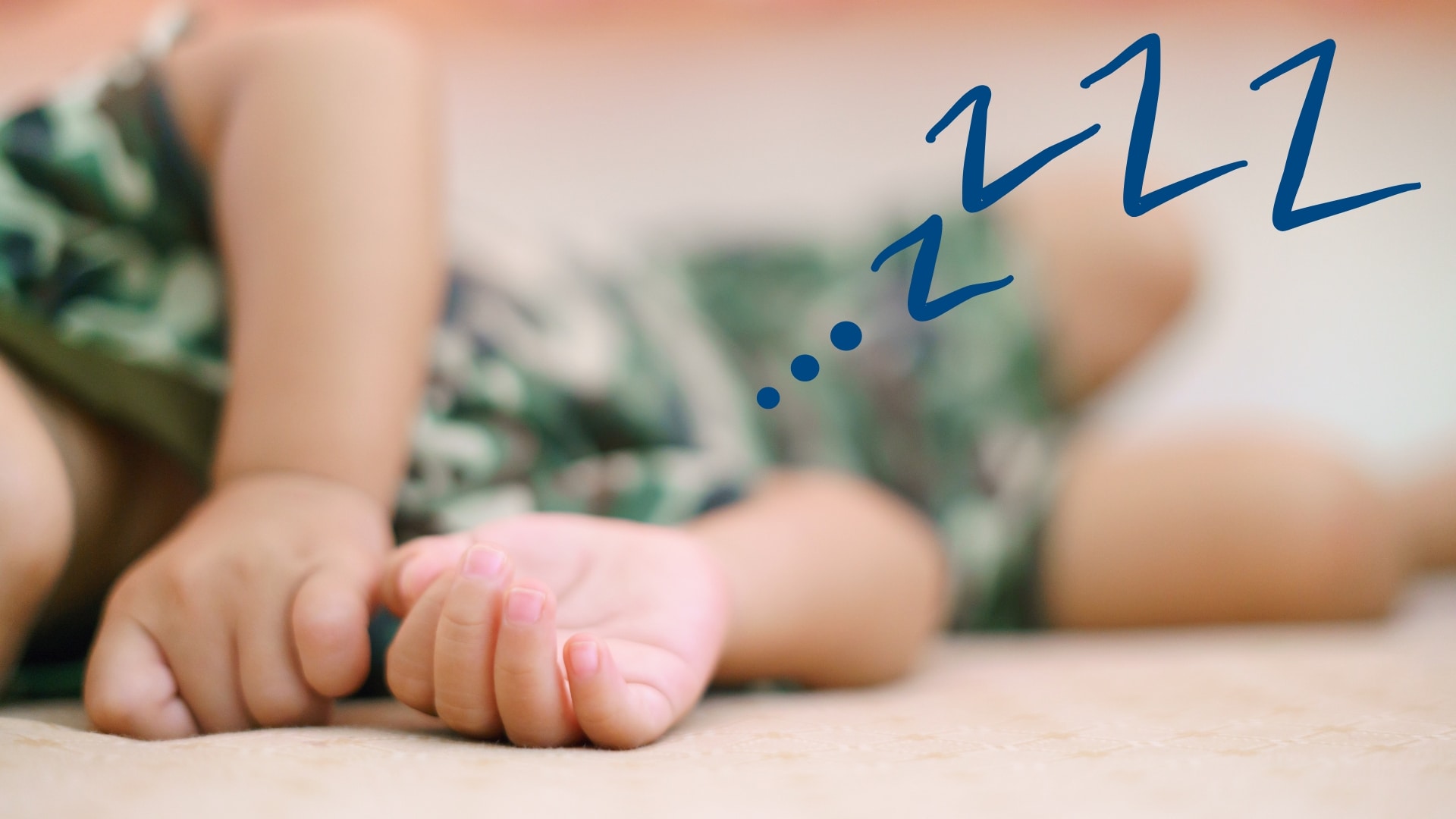
Table of Contents
What Is Sleep Training?
Sleep training is when you teach your baby to fall asleep independently and sleep through the night. It involves developing healthy sleep habits and breaking negative sleep associations. This is done by gradually teaching your baby to fall asleep on their own without the need for external soothing, such as contact napping, being rocked, or being fed to sleep.
Is 11 Months Too Late To Sleep Train?
No, 11 months old is not too late to start sleep training!
In fact, I believe it’s never too late to sleep train.
At 11 months of age, your child is developmentally able to sleep through the night without feeding and they will be able to fall into a sleep routine relatively easily which makes it a perfect time for learning new sleep patterns.
How Long Does It Take To Sleep Train An 11-Month-Old?
The length of time it takes to sleep train an 11-month-old will depend greatly on your resolve and your baby’s temperament.
And in truth… there is no set time for how long sleep training at 11 months SHOULD take and you may experience periods of success followed by periods when your little one wakes more at night or struggles to settle.
But in my experience, the changes implemented from sleep training 11-month-old babies usually take anywhere from 3 days to 3 weeks to stick.
TOP TIP: Avoiding overtiredness is a crucial factor in determining the success of sleep training. An overtired baby has a harder time falling asleep and staying asleep. So ensuring your baby is getting enough daytime sleep can make the difference between success and failure.
Will Sleep Training Harm An 11-Month-Old?
Contrary to some concerns, sleep training done properly does not harm children. Research shows it can benefit both parents and babies.
A study by the American Academy of Pediatrics divided infants into two groups – one went through sleep training, and the other did not. They measured the babies’ cortisol stress levels, parental satisfaction, parental stress, and the children’s attachment styles at one year old.
Results found that babies who were sleep-trained had decreased cortisol by the end of the training, indicating lower stress.
And at one year old, there was no difference in attachment style or behavior between the groups.
So with the right methods and environment, sleep training helps babies learn to self-soothe without negatively impacting development.
Looking to get your little one to sleep quickly and effortlessly? Check out my Bedtime and Nap Cheat Sheet and master the art of making daytime naps and bedtimes as seamless as possible.
A bedtime & nap cheat sheet so good your little one will ask you to put them to bed...
Laura Williams "This is a life saver! I'm so glad I downloaded your bedtime & nap cheat sheet. My little one actually asked me to put him to bed last night! Unbelievable! Thank you so much!"
Click Here For The FREE Cheat Sheet
Preparing for Sleep Training
At 11 months of age, babies are learning lots of new skills rapidly, such as crawling, cruising, and maybe even taking their first few tentative steps which can impact their sleep patterns and trigger sleep regressions resulting in them fighting sleep and waking more often at night.
And as a result of these sleep disruptions, you may want to start sleep training.
However, there are several things you should always have in place BEFORE you start sleep training.
These tactics are the foundation of my nannying career and I firmly believe that by implementing them, you will make sleep training run more smoothly and in some cases… avoid having to sleep train at all.
This is because there is so much more to sleep training than just picking a method and implementing it.
So before you dive into sleep training your 11-month-old, put this essential list in place so that you can begin to guide your little one towards independent sleep and self-soothing naturally:
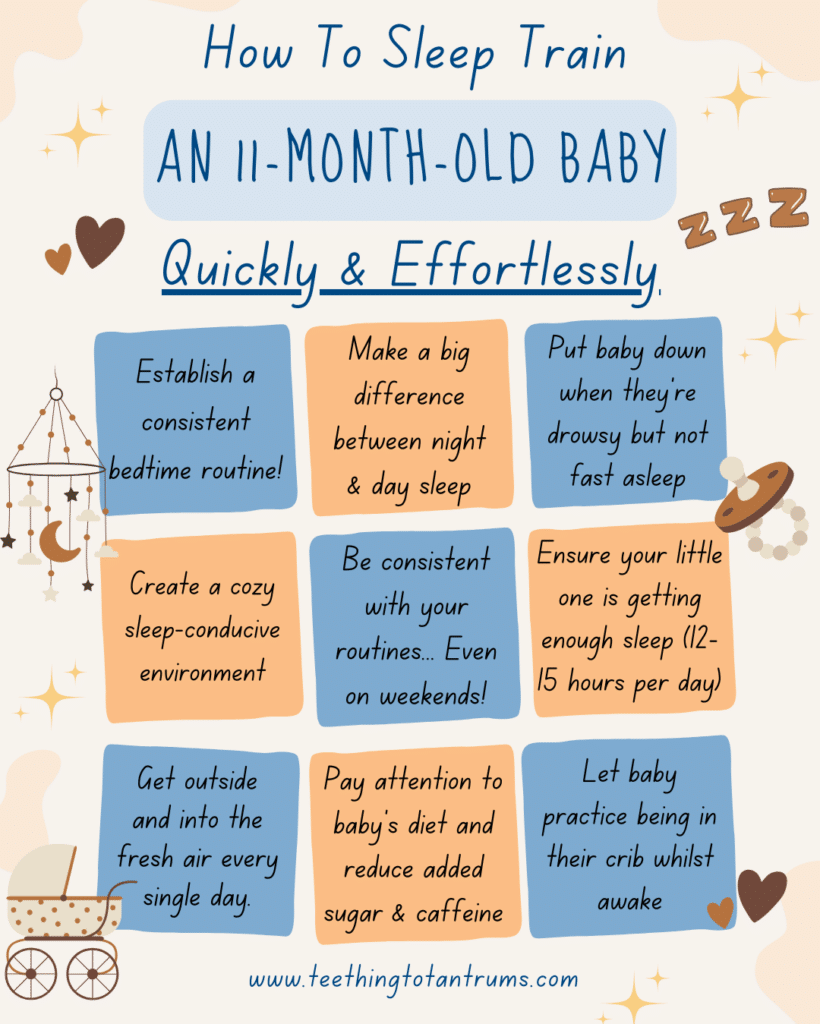
- Establish a bedtime routine. First and foremost (and this is something I am always emphasizing) creating a consistent bedtime routine is essential for your baby. Start with calming activities an hour before bed. Follow this with a bath, maybe a baby massage, reading a bedtime book, feeding, and then bed. Consistency is key to setting your baby’s sleep-wake cycle, making it easier for them to know when it’s time to sleep.
- Make a marked difference between daytime and nighttime sleep. Daytime naps can be accompanied by housework in the background, TV noises, and vacuuming, for example. Nighttime sleep should be dark, quiet, and cozy. Nighttime interactions and feedings must be low-key with little to no talking and no bright lights. Consider using a nightlight to help keep the sleep environment consistent.
- Put baby down to sleep while drowsy but not fast asleep. I know this is easier said than done… but try to encourage your little one to fall into a deep sleep independently. Consider warming their sheets so your 11-month-old is not getting into a cold crib and if they squirm slightly, gently rest your hand on their tummy to reassure them you’re still there.
- Ensure the environment in your baby’s room promotes sleep. Consider using a nightlight or white noise machine to provide comfort and to help the room feel cozy. Soft sheets and comfortable sleepwear will also help your little one feel relaxed and snuggly.
- Be consistent. Consistency is key to setting your baby’s sleep-wake cycle, making it easier for them to know when it’s time to sleep. Stick to the same routine at the same time every night and avoid making exceptions, even on weekends. It is very important to keep bedtimes and naps on schedule and at the same times daily.
- Ensure your little one is getting enough age-appropriate daytime sleep to avoid overtiredness which can disrupt the entire sleep schedule. Also, keep an eye on your baby’s wake windows to ensure they’re not awake for too long to prevent overstimulation. For an 11-month-old, their wake window is typically around 3-4 hours. Read my post on the 11-month sleep schedule to learn what to expect.
- Get outside in the fresh air and natural light every day to balance your baby’s circadian rhythm and melatonin levels and promote healthy sleep.
- Pay attention to baby’s diet. Avoid sugary or caffeinated food and drinks in the evening and make sure they have plenty to eat during the day so that hunger is not the cause of nighttime waking. 11-month-olds need between 850 and 900 calories a day, of which at least half should come from breast milk or formula.
- Let baby practice being awake and alone in the crib without the pressure of going to sleep. Putting your little one in the crib to look at an interesting mobile, like this one from Manhattan Toys while you take a quick shower is a good way of getting them used to being awake alone in their sleep space. This can help with teaching them to self-soothe and not always cry out on waking.
TOP TIP: Encourage independent play by not constantly entertaining and amusing your baby. This can involve putting them in a pack-and-play for short periods or simply letting them enjoy exploring a toy or play activity with you watching from a safe distance and not interacting.
11-Month-Old Sleep Schedule
Before you start sleep training it is important that you know how much age-appropriate sleep in a 24-hour period your little one needs.
Your 11-month-old will need between 11 to 14 hours of sleep in 24 hours. They will take 10 to 12 hours at night and the remaining 2 to 3 hours will be taken across 2 daytime naps.
Your baby’s overall sleep quality, the timing of naps and bedtime, and their sleep duration are hugely important as they impact the success of your sleep training.
If you are unsure how to establish a healthy sleep schedule for your 11-month-old take a look at this post: The 11-Month Sleep Schedule We Should Be Aiming For
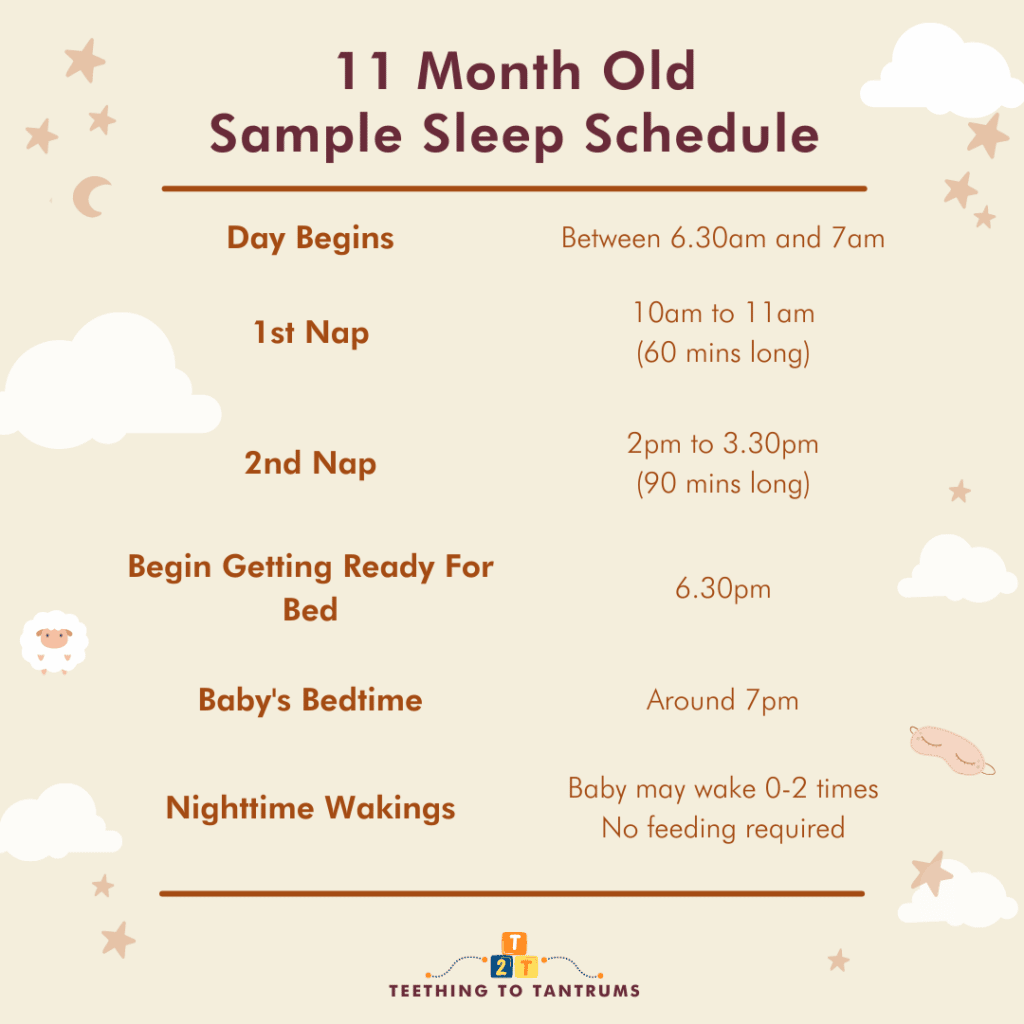
TOP TIP: If you have not yet started night weaning now would be a good time as 11-month-olds can sleep through the night without feedings. Continue to implement a dream feed if it helps and if your baby is taking a bottle to fall asleep, read this post to learn how to wean them off it.
Suitable Sleep Training Methods For An 11-Month-Old
If, after implementing the preparation steps above, your little one is still struggling to self-soothe then you will need to decide which sleep training method to try.
I am in favor of gentle sleep training techniques at this age that avoid causing excessive distress for you or your baby.
Remember, each baby’s sleep pattern is unique, so you may need to adapt these techniques to suit your baby’s individual needs and consult with a pediatrician for personalized advice.
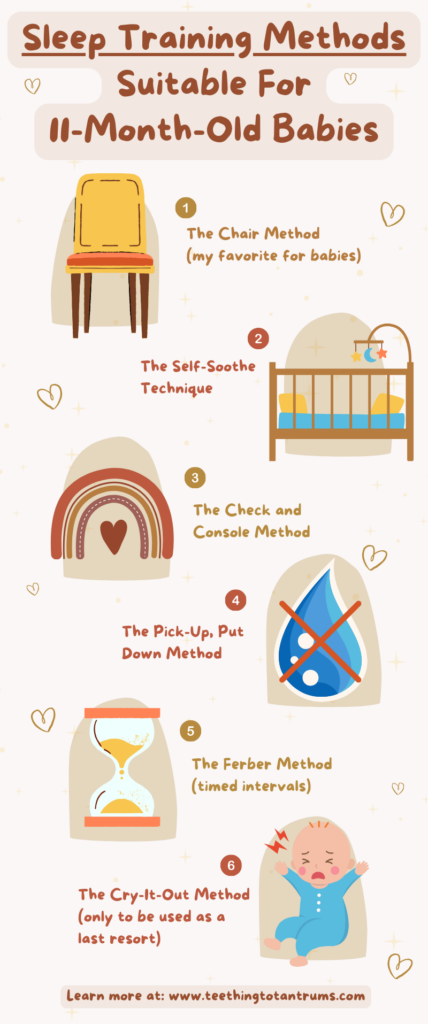
1. The Chair Method (My Favorite)
The Chair Method is my go-to sleep training method for 11-month-old babies and one that I have found to be very effective.
To implement this gradual and comforting method, stay in the room with your little one after you have said goodnight, and sit next to their bed until they fall asleep.
Night after night, move the chair further away from the crib.
If your baby whines, wait a little while to see if they’ll resettle by themselves. If they don’t, offer a pat or rub on the tummy to soothe your baby back to sleep, then return to your chair.
2. The Self-Soothe Technique
The Self-Soothe Sleep Method is a more subtle sleep training style and the one I would always recommend parents try if the Chair Method has not worked.
It involves helping your baby to fall asleep on their own without any assistance from you by putting into place a routine that gives them the best possible chance to fall asleep independently.
This means weaning off contact napping, having a consistent nap and bedtime routine, putting your baby down when they are drowsy and not fast asleep, and gradually reducing the amount of time you spend with your baby settling them.
(Essentially all the sleep habit tips I outlined at the beginning of this post)
You can also consider using a pacifier at night if it helps baby settle.
3. The Check and Console Method
The Check and Console Method involves going into your baby’s room at timed intervals to offer comfort without picking them up.
This reassurance can be singing a lullaby, rubbing their tummy, offering a gentle forehead stroke, or a rub on the back of the hand.
Once your baby has settled back down, you leave them to settle themselves into a deep sleep independently.
It helps to teach self-soothing, as you reassure your child without fully intervening. Gradually, you increase the time between checks, promoting independence and sleep.
4. The Pick-Up, Put-Down Method
Also known as the “No Tears” approach, the Pick-Up, Put-Down method also involves putting your baby down when drowsy but not fast asleep… but unlike the Chair Method, you leave them for a short while, and if your baby fusses, you pick your baby up until they are calm then put them down again.
You repeat this method until your baby manages to fall asleep without being held.
As this is a gentle sleep training method, it will be less stressful for you and your baby, but it can take longer to achieve results. Therefore, the Pick-Up, Put-Down Method can be very tiring for parents.
But many have had great success with it so give it a try if your baby needs a lot of physical reassurance to settle.
TOP TIP: Don’t rush in every time your baby wakes. A little fussing is normal and you may find your baby re-settles themself after a few minutes.
5. The Ferber Method
The Ferber Method is a very well-known sleep training technique. It is commonly interchanged with Graduated Extinction, however, the difference is that The Ferber Method involves using set time intervals to leave your baby to cry before offering comfort (2 minutes, 5 minutes, 10 minutes).
It’s a structured approach that many parents find effective. However, at 11 months of age, I would recommend trying the Chair Method or the Self-Soothe technique first as these are gentler sleep training techniques.
To learn more about the Ferber Method read my post: Ferber Method: A Proven Sleep Training Technique For Infants
6. The Cry-It-Out
Also known as the extinction method, the Cry-It-Out (CIO) Method is a stricter sleep training approach where you say goodnight and leave your baby to fall asleep without returning.
It can be challenging but yields quick results for some families.
I am not a fan of the cry-it-out method and believe it should only be used as a last resort if you’ve tried all of my tips and other techniques without success.
But I would not be doing my job if I didn’t provide you with all the options for sleep training 11-month-old babies.
To learn more about the Cry-It-Out Method read this post: The Truth About The Cry-It-Out Method From A Norland Nanny
NOTE: If you are considering using the Cry-It-Out Method, be sure to check with a pediatrician to determine if it’s appropriate for your child BEFORE implementing its strategies.
Sleep Training For Naps With An 11-Month-Old
When you’re sleep training your 11-month-old, naps will play a crucial role in the success of your baby’s nighttime sleep as they will reinforce the healthy sleep habit you are trying to establish.
Your baby’s circadian rhythm, which is their natural sleep-wake cycle, is now more established making sleep routines very achievable.
At 11 months of age, most babies are taking two 1-1.5 hour-long naps per day, typically in the mid-morning and early afternoon after the midday meal.
To ensure nap time success, follow these tips:
- Start winding down about 30 minutes before nap time.
- Have a pre-nap routine that indicates to your baby that sleep is approaching. This can be reading a short book, having a cuddle, holding a special blanket, or playing soft music to help baby associate sleep with cozy activities.
- Create a sleep-conducive environment by ensuring the nap area is quiet, dimly lit, and at a comfortable temperature. Use white noise or an audio app to block out disruptions.
- If your baby resists napping, stay patient and do not return to old habits. It takes time for new habits to form and if you start rocking your baby to sleep again, you’ll be undoing all your hard work!
To learn more about what your 11-month-old’s sleep and nap schedule should look like, read this post: The Perfect 11-Month-Old Sleep Schedule
Consider reading my article on sleep training for naps for more specific advice about helping babies learn to sleep independently during the day: Sleep Training For Naps.
And finally, as your baby approaches their first birthday, they may show signs of needing only one nap. To manage the 2-to-1 nap transition, read this post: 2 To 1 Nap Transition: How To Make The Switch Successfully
NOTE: Keep in mind that the afternoon nap should finish about 3 hours before your baby’s scheduled bedtime. Don’t be afraid to wake your little one from their afternoon nap to accommodate this or push bedtime out a little to make sure your baby is ready for sleep at bedtime.
Baby Sleep Training Books I Recommend
When implementing sleep training for your 11-month-old baby, it is really helpful to be well-informed about the subject.
Reading this article will certainly have helped!
But reading some books about specific sleep training methods will be even more helpful.
However, you must remember that your little one is a unique individual and you need to adapt to their needs.
Follow the advice that feels right for you and your baby and never embark upon a sleep training method just because it is ‘supposed’ to work quickly.
I have read many books on the subject as well as acquired a lot of experience over the years about what sleep training method works for which age group.
So without further ado, here are a few of my favorite books that I suggest reading when sleep training 11-month-old babies.
1. Healthy Sleep Habits, Happy Child by Dr. Marc Weissbluth
A fantastic sleep training resource for parents of young babies is “Healthy Sleep Habits, Happy Child” by Dr. Marc Weissbluth. It’s full of research-based tips and a step-by-step plan to help you understand the importance of sleep and how to foster it in your baby’s life.
In this brilliant book, backed by decades of research and case studies, Dr. Weissbluth presents the Ferber method, a gentle form of sleep training that involves teaching babies to fall asleep independently with check-ins.
Charts and routines cover naps, nighttime sleep, and adjusting schedules. The book also addresses common issues like bedsharing, co-sleeping, night wakings, and daytime sleepiness giving you an all-inclusive sleep training approach!
- Provides individualized plans based on baby's exact age
- Evidence-based and developmentally appropriate
- Addresses a wide variety of common sleep questions
- Offers flexibility within routines based on baby's temperament and needs
- Teaches independent sleep skills
- Requires consistency to see full effects
- Focuses heavily on rigid routines and schedules
- May be overwhelming amount of information for some
- The adaption of the Ferber Method can be difficult for some babies to handle
2. The No-Cry Sleep Solution by Elizabeth Pantley
The No Cry Sleep Solution provides strategies that steer clear of letting your baby cry it out. Instead, it offers gentler alternatives to help your baby sleep through the night. It’s particularly favored by parents of 0-5 year olds seeking a softer sleep training method.
Gently guiding your toddler to better sleep becomes less of a battle with this book. The No-Cry Sleep Solution aims to provide you with researched, kind methods that respect your child's needs.
Implementing the tips provided feels relevant and doable, as each chapter follows through with advice matched to common situations.
What's truly beneficial is the understanding of sleep you gain. It's a relief to have your experiences validated and then addressed, flipping the script on bedtime struggles.
You're not just reading; you're learning and applying new strategies each night.
- Endorsed by many parents over the last 18 years for its effectiveness
- Focused on gentle techniques
- Includes valuable research insights
- Offers specific advice for 1-5 year olds
- Follows a gentle child-centred approach
- Covers a variety of bedtime issues such as night wakings and getting your toddler to stay in bed
- May not work for every child
- Some information might overlap with books you've previously read
- The solutions require patience and time
3. The Gentle Sleep Book by Sarah Ockwell
The Gentle Sleep Book by Sarah Ockwell provides a holistic insight into childhood sleep and explains that very often our expectations are way too high when we expect our little ones to sleep through the night and that we aim for this perfection when they are not developmentally programmed to do so.
In a lot of ways, this is a book that makes parents who are battling with sleep issues feel ‘OK’ with what they are doing whether that be co-sleeping or nursing to sleep.
Sarah Ockwell Smith provides a holistic insight into childhood sleep in this book. She explains that very often our expectations are way too high when we expect our little ones to sleep through the night and that we aim for this perfection when they are not developmentally programmed to do so.
In a lot of ways, this is a book that makes parents who are battling with sleep issues feel ‘OK’ with what they are doing whether that be co-sleeping or nursing to sleep.
If you are happy to take this more relaxed approach to sleep training then this is probably the book for you.
- Offers a gentle approach to sleep training
- Offers reliable evidence-based advice
- Deals with night wakings as well as bedtime issues
- Offers advice for each developmental stage
- Covers how to deal with daytime nap issues too
- Mentions that bed sharing is OK... which is not for everyone
- The solutions take time... however, there's never a quick fix
- May be considered more of a parent self-help book than a sleep training book
Where To Buy Sleep Training Books
There are endless places to buy sleep training books. Amazon is the first place most people think of when looking for books…
However, you can try looking for free books (or for a significantly reduced price) at garage sales, libraries, charity shops, and online second-hand book shops such as Awesome Books and Better World Books.
Your friends and family may even have a copy you can borrow, so ask around!
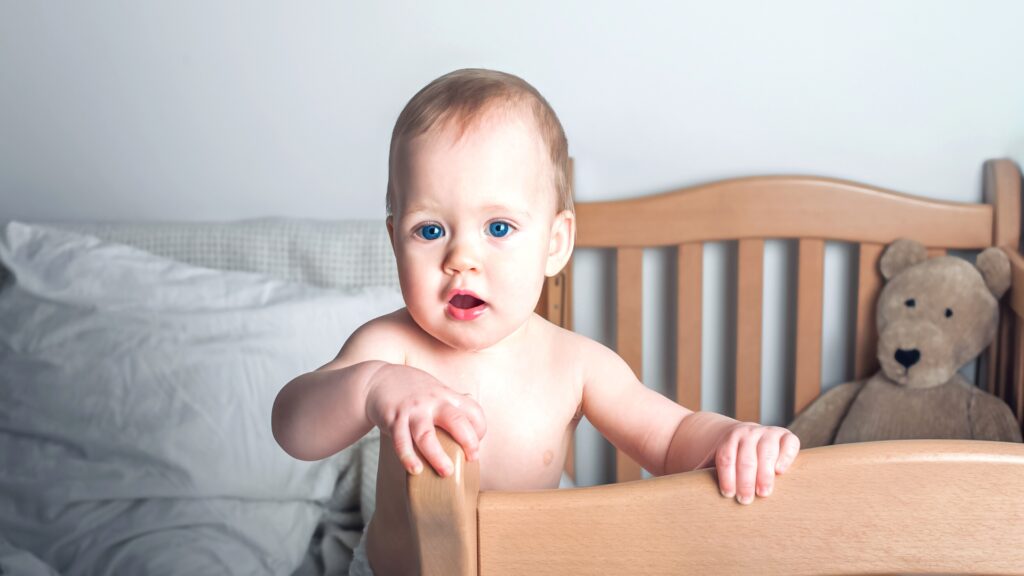
Addressing Common Sleep Training Challenges
Sleep training an 11-month-old can involve addressing some additional challenges that arise from where your baby is at in their development.
Common issues that you may have to address are:
- Teething Discomfort: Your baby may experience discomfort from teething that disrupts sleep. If your little one is suffering from teething pain offer a teething toy or a cold washcloth to chew on before bed to alleviate gum pain.
- Navigating Sleep Regressions: Sleep regressions often occur around 11 months of age. If you suspect this to be the cause of your little one’s disrupted sleep, try to maintain a calm and consistent bedtime routine to help your baby cope. During regressions, extra comfort is key, but continue to try and encourage self-soothing so that your baby learns to settle back to sleep independently. To learn more about how to handle the 11-month sleep regression, read this post: The 11-Month Sleep Regression Survival Guide.
- Check For Stressors: If there has been a major change in routine, your baby’s sleep can easily be disrupted. Whatever is going on try to maintain a peaceful and cozy sleep environment and routine to instill security. White noise machines and audio apps are great ways to offer comfort during this phase. Consider using a night light too.
- Daytime Sleep: This is very important as adequate age-appropriate naps will reduce the chances of overtiredness. An overtired baby will most definitely struggle to fall asleep and stay asleep so getting daytime sleep right can be a game changer and improve nighttime sleep significantly. Aim for two naps a day, each 1-2 hours long.
- Nap Transition: If your little one has not yet transitioned from 3 to 2 naps… they will do so very soon. Be flexible during this time and try to avoid your little one becoming overtired. Take a look at our post on how to handle nap transitions: Mastering The 3 To 2 Nap Transition Effortlessly.
- Separation anxiety can peak around 10-12 months old. To help limit this, practice brief separations during the day either by leaving them with a trusted friend or family member and encouraging them to play independently for short periods in their crib or pack-n-play.
When To Seek Medical Advice
If you’re concerned about your 11-month-old’s sleep patterns, it is a good idea to contact a pediatrician to put your mind at rest and enable you to move forward confidently with your sleep training.
While sleep at night should gradually improve as your baby learns to self-soothe and gain independence… If your 11-month-old is showing any of the following signs, consult a medical professional as soon as possible:
- Baby is excessively drowsy during wake windows or there are concerns with their circadian rhythm
- There has been a sudden change in nighttime sleep quality after your baby has been sleep-trained,
- Your baby is not consuming enough solid food during the day
- They are persistently crying,
- They are experiencing breathing difficulties at night including unusual wheezing during sleep
- Baby is persistently coughing,
- And they’re showing signs of dramatic changes in behavior.
Always remember, that seeking advice is a proactive step in ensuring your child’s well-being. If you have any doubts about your little one’s health or sleep habits, don’t hesitate to reach out to a healthcare provider.
NOTE: Keeping track of your baby’s nap and nighttime sleep in a diary is an incredibly valuable asset if you need to talk to a pediatric sleep consultant about your little one’s sleeping habits.
With one spacious page dedicated to each day, you'll have plenty of room in this delightful planner to write down all your to-dos, appointments, and notes for the year.
Ideal for parents tracking baby's sleep, feeding, and pooping schedules...
Or a sleep journal for toddlers...
Whatever your requirements for the diary need to be, this handy planner will tick the right boxes.
Frequently Asked Questions About Sleep Training 11 Month Old Babies
When sleep training your 11-month-old, you may have a lot of questions. This section aims to provide clear and concise answers to the common concerns parent’s have.
Q: Can I use the Ferber method for my 11-month-old, and what should I consider?
A: Yes, you can use the Ferber method for your 11-month-old. This technique involves gradually allowing your baby to self-soothe by waiting longer periods before intervening during their cries. It’s vital to maintain a consistent routine and ensure your baby is healthy and not going through any major developmental changes. Consult with your pediatrician to determine if this method is appropriate for your child’s specific needs and bear in mind that you will have to be happy with letting your little one cry for short periods.
Q: How can I transition my 11-month-old to nap independently during the day?
A: To transition your baby to nap independently, establish a calm and consistent naptime routine. If your baby is ready for sleep they will sleep better so keeping an eye on wake windows is important. Your 11-month-old should be awake for 2.5 to 3.5 hours between naps. Gradual changes, like rocking less each day, can help ease the transition to independent napping, and encouraging your little one to play independently for short periods during the day can help too.
Q: How do I get my 11-month-old to sleep through the night?
A: To help your 11-month-old sleep through the night, create a predictable bedtime routine and a sleep-conducive environment. If your baby wakes up at night, give them a few minutes to settle down before checking on them. Use a white noise machine for added comfort and keep nighttime interactions low-key. If you have not done so now is the time to phase out night feedings to help your little one break the habit of waking to feed/suck.
Q: How do I get my 11-month-old to sleep alone?
A: To help your 11-month-old sleep alone, begin by establishing a consistent bedtime routine to signal it’s time to sleep. Keep rocking to a minimum then put them down while they’re drowsy but still awake. I would then implement the Chair Method by staying close for the first few minutes to reassure them, then gradually increasing the distance from the crib each night.
Q: Is sleep training damaging?
A: No, sleep training is not considered damaging when done correctly and sensitively. It can teach your child healthy sleep habits and self-soothing skills. But remember, it’s always important to respond to your little one’s needs and to consult a healthcare professional if you have concerns.
Need More Parenting Help?
- Download our FREE Bedtime & Nap Sleep Cheat Sheet. It’s a free, easy-to-use and proven formula designed for parents of 0-5 year olds to master the art of consistently undisturbed and restful sleep without the yelling, nagging or exhausting long-winded evenings.
- Check out our Parenting Toolbox. You’ll get access to expertly-chosen products that you can guarantee are the best for your little one and your wallet.
- Are you looking for personalized guidance to navigate the challenges of parenting? I offer 1-on-1 consultations to bring you tailored strategies and actionable advice to help support your child's growth and well-being with confidence.

A bedtime & nap cheat sheet so good your little one will ask you to put them to bed...
Laura Williams "This is a life saver! I'm so glad I downloaded your bedtime & nap cheat sheet. My little one actually asked me to put him to bed last night! Unbelievable! Thank you so much!"
Click Here For The FREE Cheat Sheet






